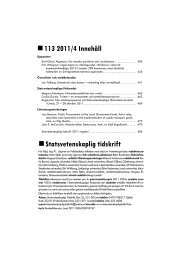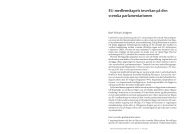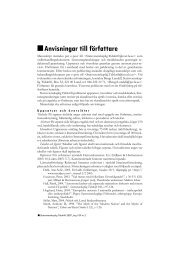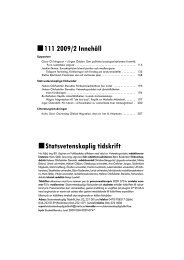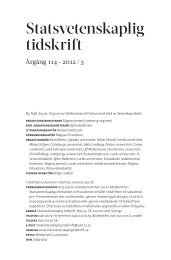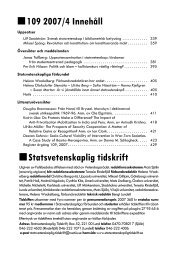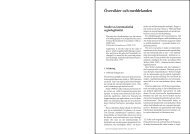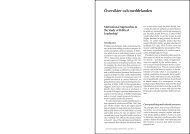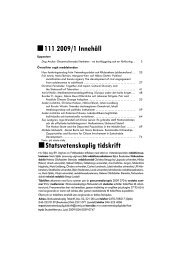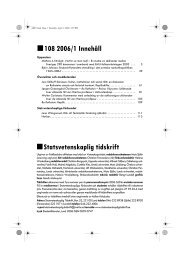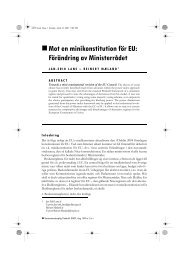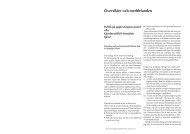Hela nummer 2007/1 (PDF, 2047 kb) - Statsvetenskaplig tidskrift
Hela nummer 2007/1 (PDF, 2047 kb) - Statsvetenskaplig tidskrift
Hela nummer 2007/1 (PDF, 2047 kb) - Statsvetenskaplig tidskrift
You also want an ePaper? Increase the reach of your titles
YUMPU automatically turns print PDFs into web optimized ePapers that Google loves.
st071.book Page 79 Sunday, March 4, <strong>2007</strong> 5:48 PM<br />
underline that the changes that Russia has<br />
gone through since 2000 should not be<br />
viewed as the result of Putin’s personal<br />
power or the power of the current government.<br />
Instead, it is the current federal<br />
paradigm that is strong. In fact, the paradigm<br />
shift that began in 1998 and consolidated<br />
in 2000 has permeated many aspects<br />
of Russia’s political and social life<br />
with a conservative emphasis (stronger<br />
patriotism, a strong state ideal, restoring<br />
Russia as an empire) combined with a<br />
rather liberal economic policy. Consequently,<br />
provided this political discourse<br />
will continue to dominate Russian politics<br />
Putin will simply be replaced by a person<br />
with a very similar political approach in<br />
the presidential election in 2008.<br />
Slutreplik från Andrey<br />
Makarychev<br />
Indeed, Johnny Rodin’s comments seem<br />
to confirm that the question of why the<br />
Putin’s regime was so successful in reinstalling<br />
the mechanisms of centralization<br />
is of core significance for his research.<br />
This policy of recentralization is semantically<br />
expressed through a number of normative<br />
concepts like “political consensus”,<br />
“pro-Putin majority”, and some others<br />
that constitute the kernel of a “unitary<br />
discourse” of power, to put it in Foucaultian<br />
terms. In political terms, the success of<br />
recentralization efforts could be explained<br />
by Putin’s skillful usage of two key arguments:<br />
firstly, the governors’ fear of further<br />
popular elections which, as many of<br />
79<br />
them deemed, were too risky for their future<br />
careers, and secondly, the widely<br />
spread belief that electoral procedures are<br />
deeply corrupted and easily manipulated.<br />
Yet, in my mind, one step further has to<br />
be taken at this juncture, namely in the direction<br />
of finding out the nature of consensus<br />
associated with the incumbent<br />
President. Is it a “rational” consensus justified<br />
by references to some sort of “ultimate<br />
knowledge” of governance, or, perhaps,<br />
it is a “political” construct that presupposes<br />
the division of the political<br />
sphere into those who are “in” and who<br />
are “out”. My argument would be that Putin’s<br />
consensus is a bordered phenomenon<br />
in a sense that it enacts the mechanisms<br />
of inclusion and exclusion widely<br />
practiced by the Kremlin. The key analytical<br />
problem is that these mechanisms are<br />
very ambiguous and function in a rather<br />
uncertain way – for example, Putin never<br />
goes public with his reasons or explanations<br />
when he nominates somebody for<br />
the governor’s position. This policy of<br />
“constructive ambiguity” seems to be intentionally<br />
designed for leaving open as<br />
many options for the federal center’s regional<br />
policy as possible.<br />
Yet the interplay of inclusion and exclusion<br />
may turn into an even more interesting<br />
question since, as Johnny Rodin rightly<br />
assumes, Putin is to be replaced by his<br />
successor rather shortly. Does it mean<br />
that the system constructed by Putin will<br />
inevitably exclude its founder for the sake<br />
of self-preservation?<br />
■ L ITTERATURGRANSKNINGAR



